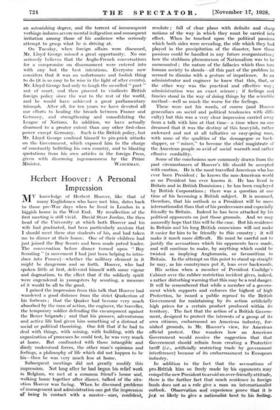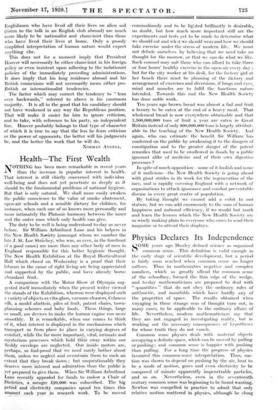Herbert Hoover : A Personal Impression M Y knowledge of Herbert
Hoover, like that of many Englishmen who have met him, dates back to those pre-War days when he lived in London in a biggish house in the West End. My recollection of the first meeting is still vivid. David Starr Jordan, the then head of the University at which both Hoover and his wife had graduated, had been particularly anxious that I should meet these star students of his, and had taken me to dinner at their house. One of their children had just joined the Boy Scouts and been made patrol leader. The conversation before dinner turned upon " BOy Scouting " (a movement I had just been helping to intro- duce into France)—whether the military element in it might be dangerous and so forth. Hoover, who had spoken little at first, delivered himself with some vigour and dogmatism, to the effect that if the soldierly spirit were engendered in youngsters by scouting, a measure of it would be all to the good.
I gained the impression from this talk that Hoover had wandered a good distance from the strict Quakerism of his forbears ; that the Quaker had become very much absorbed by the man of action, the engineer, the traveller, the temporary soldier defending the encampment against the Boker brigands ; and that his pioneer, adventurous and active life had given him something of a distrust of social or political theorizing. One felt that if he had to deal with things, with mining, with building, with the Organization of proceSses he could test, he was very much at home. But confronted with thoie intangible and dimly understood forces, the other man's opinions and feelings, a philosophy of life which did not happen to be his—then he was very much less at home.
Subsequent Meetings did not greatly modify this impression. Not long after he had begun his relief work in Belgium, we met at a common friend's house and, walking home together after dinner, talked of the situ- ation Hoover was "facing. When he discussed problems of management and administration one got the impression or being lb Contact with a master=-sure, confident; resolute ; full of clear plans with definite and sharp notions of the way in which- they must be carried into effect. When he touched upon the political passions which both sides were revealing, the role which they had played • in the precipitation of the disaster, how those passions could be handled in any future reorganization ; how the stubborn phenomenon of Nationalism was to be surmounted ; the nature of the fallacies which thus tore . human society to shreds—all this part of the problem he seemed to dismiss with a gesture of impatience. As an administrator and engineer he knew that this, that, or the other way was the practical and effective way ; administration was an exact science ; if feelings and fancies stood in the way of doing things by the scientific method—well so much the worse for the feelings.
These were not his words, of course (and Hoover generalizes on social and political tendencies with diffi- culty) but this was a very clear impression carried away from a talk with him at that time—a time when no one dreamed that it was the destiny of this heavyish, rather awkward and not at all talkative or easy-going man, with none of the qualities of the demagogue or back- slapper, or " mixer," to become the chief magistrate of the American people so avid of social warmth and rather effusive cordiality.
Some of the conclusions now commonly drawn from the past circumstances of Hoover's life should be accepted with caution. He is the most travelled American who has ever been President ; he knows the non-American world as no President has ever known it. He has lived in Britain and in British Dominions ; he has been employed by British Corporations ; there was a question at one time of his becoming a British subject. It is assumed, therefore, that his outlook as a President will be more internationalist than that of his predecessors and especially friendly to Britain. Indeed he has been attacked by his political opponents on just those grounds. And we may assuredly hope that this will be the case. But his residence in Britain and his long British connexions will not make it easier for him to be friendly to this country ; it will make it much more difficult. He must be careful not to justify the accusations which his opponents have made, and will continue to make, by anything which could be twisted as implying Anglomania, or favouritism to Britain. In the attempt on this point to stand up straight he may, as his countrymen put it, lean over backwards.
His action when a member of President Coolidge's Cabinet over the rubber restriction incident gives, indeed, a rather disturbing warning that this may be a real danger. It will be remembered that while a member of a govern- ment which supports and enforces the highest of high Protection, he issued a public reproof to the British Government for maintaining by its action artificially high prices for a certain product produced within its territory. The fact that the action of a British Govern- ment, designed to protect the interests of a group of its own citizens, embarrassed an American industry, fur- nished grounds, in Mr. Hoover's view, for American official protest. One wonders how an American Government would receive the suggestion that that Government should refrain from creating a Protective tariff (i.e., artificially restricting trade ' by government interference) because of its embarrassment to European industry.
• In addition to the fact that the accusations of Pro-British bias so freely made by his opponents may compel the new President to avoid an over-friendly attitude, there is the further fact that much residence in foreign lands does not as a rule give a man an internationalist outlook. Observation and experience prove that it is juit as likely to giVe a nationalist bent to his feeling. Englishmen who have lived all their lives on alien soil (listen to the talk in an English club abroad) are much more likely to be nationalist and chauvinist than those who have lived their lives at home. Only a grossly simplified interpretation of human nature would expect anything else. This does not for a moment imply that President Hoover will necessarily be either chauvinist in his foreign policy or even insistent upon adhering to the isolationist policies of the immediately preceding administrations. It does imply that his long residence abroad and his British connexions will not necessarily mean either pro- British or internationalist tendencies.
. The factor which may correct the tendency to " lean over backwards," referred to above is his enormous majority. It is all to the good that his candidacy should not have weakened in any way the Republican position. That will make it easier for him to ignore criticism, and to take, with reference to his party, an independent line. Hoover probably belongs to that type of character of which it is true to say that the less he fears criticism or the power of opponents, the better will his judgments be, and the better the work that he will do.
NORMAN ANGELL.







































 Previous page
Previous page